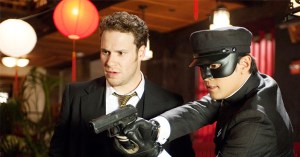The Evolution of City of Men
Director Meirelles shows the passion, darkness, and fervor of life in the favela.
Brazilian slums known as “favelas” paint a distinct landscape
for Rio de Janeiro. Hollywood films dance with this shantytown imagery — the
recent theatrical release of The Incredible Hulk comes to mind — but
only as a scenic jumping point to explosions, gunfights and special effects.
Director Fernando Meirelles, however, brings to life the
complexity of struggles, passions, and fervor of life in the “favela,” first with
his crime drama film City of God, then with the TV mini-series City of
Men, and most recently with the movie adaptation of City of Men. Not being
content to portray the neighborhoods as simply urban eye-candy backdrop, City
of God (Meirelles’s first film, co-directed with Kátia Lund) in 2003 honed
in on the gritty lifecycle of the “favelas,” covering a two-decade time span. In
that duration, we see the five main characters being transformed by the
oppressive poverty and crime in the region, and see the fruits of their toils as
they grow up from child to adolescent to adult.

The authenticity of the experience set apart City of
God from mainstream films, which can take on an empathetic but condescending
perspective on poverty. For casting, there was only one professional actor with extensive film experience: Matheus Nachtergaele, who played Cenoura (Carrot).
The rest were select from of the real-life City of God favela and placed into an
intensive acting workshop for several months, where they learned to improvise
and reenact shootouts (an all-too common occurrence in the brutal cocaine drug
trade).
The film received critical acclaim, scoring a
92% on Rotten Tomatoes,
and became the highest-grossing foreign film of 2003 in the United States.
Following City of God‘s international success,
directors Kátia Lund and Fernando Meirelles made an off-shoot TV show, called City
of Men. Airing on Brazilian television in 2002, it starred Douglas Silva
(who also appeared in City of God) as Acerola and Darlan Cunha as
Laranjinha. Acerola and Laranjinja are best friends, growing up as bright-eyed
teenagers wanting to fulfill their dreams and aspirations. Contrasting to the
darker and bloody mood of its cinematic predecessor, City of Men took a
more light-hearted approach to life in a Rio favela, while still covering issues
of poverty and drug war.

After a four-season TV run, City of Men was turned
into a full-fledged movie by the same name. Released internationally at the
end of 2007, the film was directed by Paulo Morelli and produced by Meirelles. Starring the same duo of Acerola and Laranjinha, the
18-year-old friends find themselves at a crossroads. As they grow older, the
threat and allure of falling into the ranks of a Rio favela gang become all the
more real, and a dark secret from the past jeopardizes their long-forged
friendship. They also each bear their own burdens — Laranhinja sets out to find
a father he never met; Acerola struggles with a precocious life of matrimony and
caring for a son. In contrast to the TV show, the motion picture adopts a
grimier mood similar to City of God.
The film version of City of Men received positive
reviews, scoring 77% on
Rotten Tomatoes. For those who missed out on the latest from Meirelles, the
DVD version of City of Men releases on July 1st.
View Trailer Here







